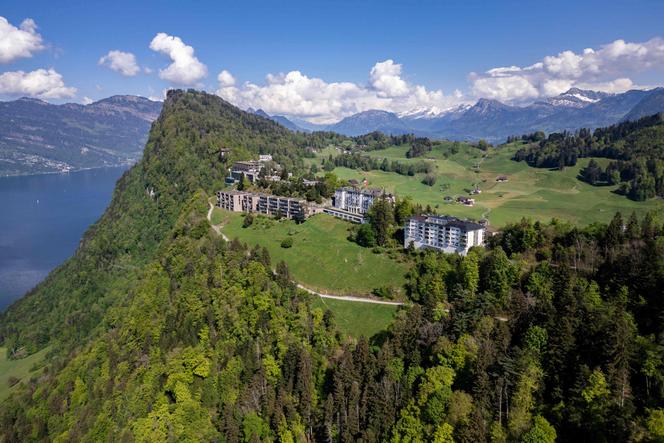

LETTER FROM GENEVA

It's hard to find a more picturesque setting. A few Art Nouveau buildings stand on a meadow so green it almost hurts the eyes, overlooking an Alpine lake whose waters can't quite decide between turquoise and emerald green. The Bürgenstock resort (in the canton of Nidwalden, central Switzerland) offers an unparalleled view of Switzerland's most winding body of water, the Lac des Quatre-Cantons, which English-speaking tourists, the first foreign visitors, prefer to call Lake Lucerne.
The 60 hectares of this timeless, carefree estate are an emblematic part of the Swiss imagination. An editorialist in the newspaper Le Temps described it as "part Grand Budapest Hotel, part Palm Springs neighborhood and part vacation village; part stopover on the Grand Tour [a long trip around Europe made by privileged young people], from Konrad Adenauer to Audrey Hepburn, and part school excursion destination for the little Swiss of yesteryear."
Two weeks ago, Swiss diplomacy sent invitations to some 160 embassies, inviting them to a "peace conference" on Ukraine scheduled for June 15 and 16. By Wednesday, May 15, 50 embassies had responded positively. The country hopes to welcome around a hundred heads of state and government. Bern's idea is to demonstrate that the Confederation remains a modest and benevolent player, always ready to use its good offices as a mediator to work toward world peace. For decades, this somewhat mythologized role has enabled Switzerland to justify its status as a neutral state, never really involved in world affairs, never really affected by geopolitical upheavals, yet knowing how to profit from them.
"'Good offices' have long been at the heart of Swiss foreign policy, but they have lost much of their luster. They remain, however, the lowest common denominator on which everyone, from left to right, can agree, and are often used as an excuse not to get involved in foreign policy," explained Sacha Zala, historian of Swiss diplomacy.
In other words, Switzerland has consistently responded to criticism of its neutral stance by asserting that this very position makes it ideally suited to play the role of mediator. Swiss diplomacy has had its share of successes, such as providing good offices during the Algerian war of independence in 1962; and its share of failures, notably when Bern attempted to intervene in military conflicts. The Federal Council's idea of ending the 1956 Suez crisis with a peace conference ended in fiasco. The attempt to mediate between North Vietnam and the USA in 1968 also failed. And when Switzerland offered to mediate between the British and Argentinians during the Falklands War, an annoyed Margaret Thatcher didn't even take the call.
You have 53.27% of this article left to read. The rest is for subscribers only.
